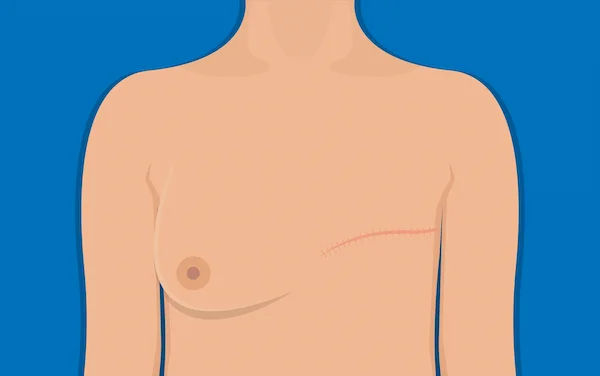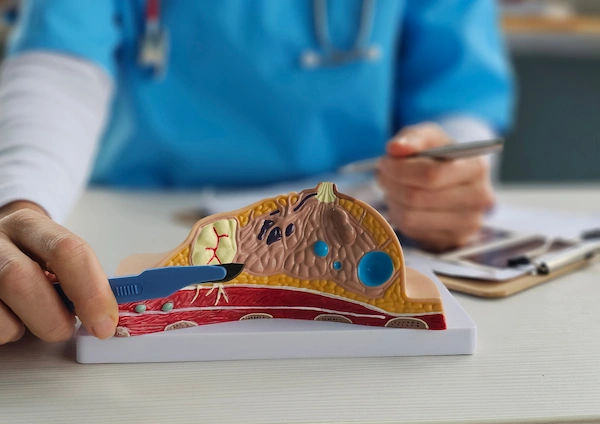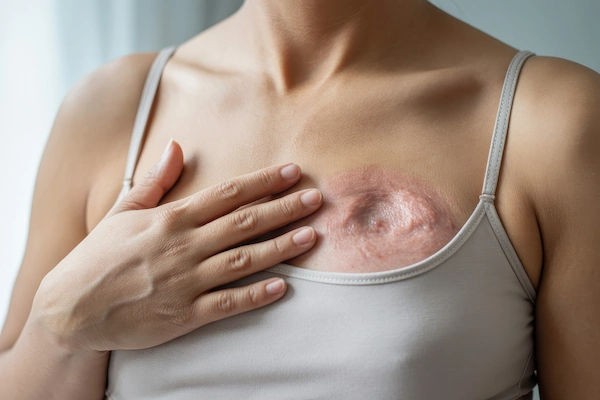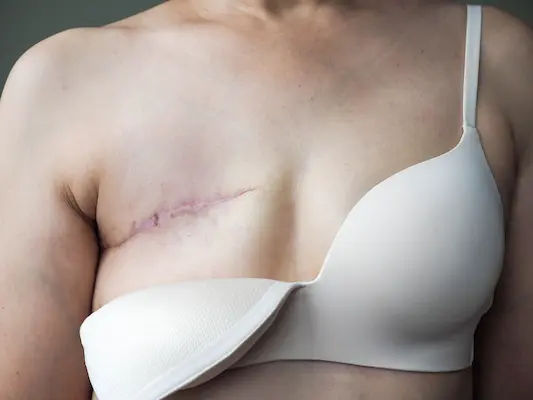How to Reduce Man Boobs: A Comprehensive Guide
Learn how to reduce man boobs (gynecomastia). Discover diet, exercise, lifestyle changes, and medical options for a more masculine chest.

Written by Dr.Sonia Bhatt
Last updated on 13th Jan, 2026

Gynecomastia, commonly referred to as "man boobs," is a condition that causes the enlargement of breast tissue in men. It can result in a loss of confidence and self-esteem, and in some cases, it can even cause physical discomfort. Although it is a common condition, it often goes undiagnosed or untreated, leading many individuals to feel embarrassed or isolated. The good news is that with proper understanding, lifestyle adjustments, and in some cases, medical interventions, gynecomastia can be managed and even reduced.
Understanding the Causes
Various factors affect hormone levels, body composition, and overall health, causing gynecomastia to develop. A deeper knowledge of these causes is important for effectively treating the condition.
Hormonal Imbalances and Their Effects
The most common reason for gynecomastia is a hormonal imbalance. Normally, this happens when the ratio of oestrogen (a female hormone) to testosterone (a male hormone) increases. This imbalance leads to the growth of breast tissue in men. Hormonal changes can occur during various stages of life, such as puberty, ageing, and in response to certain medical conditions or medications.
During puberty, it is quite common for young men to experience temporary gynecomastia as their bodies go through rapid hormonal changes. In most cases, the condition resolves on its own as hormone levels stabilise. However, for some, the condition persists into adulthood.
Lifestyle Factors Contributing to Gynecomastia
Certain lifestyle habits can also play a role in developing man boobs. For example, eating a lot of processed foods, sugary snacks, and unhealthy fats can cause weight gain, including extra fat around the chest. Not getting enough exercise and living a mostly inactive lifestyle can make the problem worse, making the chest appear more noticeable.
Also, drinking too much alcohol or using drugs like anabolic steroids can mess with your hormones, making it more likely to develop gynecomastia.
Medical Conditions Associated with Man Boobs
A number of medical conditions can contribute to the development of gynecomastia. These include:
Liver disease: Conditions like cirrhosis can alter hormone metabolism and lead to a rise in oestrogen levels.
Thyroid problems: Hypothyroidism, or underactive thyroid, is linked with weight gain and hormonal imbalances.
Kidney failure: Impaired kidney function can affect the body’s ability to excrete excess hormones.
Obesity: Excess body fat can convert testosterone to oestrogen, leading to an imbalance.
In some cases, gynecomastia is idiopathic, meaning no obvious cause can be found.
Diagnosis of Gynecomastia
Getting the right diagnosis is important to understand how serious gynecomastia is and to figure out the best treatment. A doctor will do several checks to confirm the diagnosis and make sure there are no other reasons for the breast tissue enlargement. An accurate diagnosis helps create a treatment plan that focuses on both the physical and emotional parts of the condition.
Clinical Evaluation
If you're worried about man boobs, the first thing to do is see a doctor. The doctor will ask about your medical history, lifestyle, and any symptoms you're having. They will also examine your chest to check the size, texture, and how sensitive the breast tissue is.
Diagnostic Tests and Their Significance
Sometimes, additional tests are needed to find out the exact cause. These tests might include:
Blood tests: These tests check hormone levels like oestrogen and testosterone and look for any issues.
Imaging tests: An ultrasound or mammogram may be used to look at the breast tissue and make sure there are no other problems, like tumours.
Biopsy: In rare cases, a small sample of tissue might be taken to check for cancer. However, gynecomastia is very rarely linked to breast cancer in men.
Lifestyle Changes to Reduce Man Boobs
Making changes to your lifestyle is one of the best ways to reduce man boobs. This means eating healthier, getting regular exercise, and keeping a healthy weight. These changes can help reduce the appearance of gynecomastia and improve your overall health.
Importance of Diet in Managing Gynecomastia
Eating a healthy, balanced diet is key to managing gynecomastia. A diet full of whole foods like fruits, vegetables, lean proteins, and healthy fats helps keep your hormones in balance and supports overall health. Be careful with foods that are high in phytoestrogens (plant-based compounds that act like oestrogen), as they can make the condition worse if eaten too often.
It's also important to cut back on processed foods, sugary drinks, and refined carbs, as these can cause weight gain and extra fat around the chest area.
Exercise Routines for Reducing Chest Fat
Regular physical activity is one of the most effective ways to reduce the appearance of man boobs. While it may not directly target the chest tissue, cardiovascular exercises and strength training can help burn fat and tone the muscles underneath the breast tissue.
Focus on full-body workouts that include exercises like:
Cardio: Running, cycling, swimming, or even brisk walking to burn calories.
Strength training: Push-ups, chest presses, and dumbbell flyes can help strengthen and tone the pectoral muscles, which may improve the appearance of the chest.
Role of Weight Loss in Reducing Man Boobs
Since gynecomastia is often associated with excess body fat, weight loss can significantly improve the condition. Adopting a healthy eating plan and combining it with consistent exercise can help you lose weight and reduce fat, including around your chest area. Even modest weight loss can make a noticeable difference in the size and shape of the chest.
Medical Treatments
In some cases, medical treatments may be necessary to address gynecomastia, especially when lifestyle changes are insufficient. These treatments can include medications to correct hormonal imbalances or surgical options for more severe cases. It’s essential to consult with a healthcare professional to determine the most appropriate treatment plan for your specific situation.
Medications That Can Help
In cases where gynecomastia is linked to a hormonal imbalance, medications may be prescribed to correct the imbalance. For example, anti-oestrogen medications such as tamoxifen can block the effects of oestrogen on the breast tissue. Aromatase inhibitors may also be used to reduce oestrogen production.
However, medication is not always effective, especially for cases that are caused by obesity or lifestyle factors, and surgical options may be considered if non-invasive methods fail.
Surgical Options
In more severe or persistent cases of gynecomastia, surgery may be recommended to remove excess breast tissue. The most common surgical options are:
Liposuction: Removes fat from the chest area but leaves the glandular tissue intact.
Mastectomy: A more invasive procedure that removes both fat and glandular tissue.
Surgery is typically considered when gynecomastia is causing significant discomfort or psychological distress or when other treatments have not been effective.
Role of Supplements
Supplements may not be the main way to treat gynecomastia, but some men try them to help balance hormones or reduce symptoms. It's important to be careful with supplements, as they may not work for everyone and could have side effects or interact with other medications.
Popular Supplements and Their Effectiveness
There are many supplements, like herbal remedies such as turmeric, green tea extract, and fish oil, that are promoted as ways to reduce gynecomastia. Some studies suggest these supplements might help balance hormones or reduce swelling, but the evidence is not strong, so they should be used with caution.
Potential Risks and Benefits
While some supplements might help a little, they can't replace a healthy diet and regular exercise. Also, some supplements might interact with medications or cause side effects, so it's important to talk to your doctor before trying any new supplements.
Psychological Impact and Support
Living with gynecomastia can have a significant psychological impact. Understanding these emotional aspects of the condition and seeking support can be essential for managing the mental health challenges that often accompany gynecomastia.
Mental Health Aspects of Living with Gynecomastia
The physical appearance of gynecomastia can have a significant impact on a person’s mental health. Many men with the condition report feelings of embarrassment, anxiety, and depression. The social stigma surrounding body image can lead to isolation, and men may avoid situations where they are required to remove their shirts or be in close proximity to others.
Support Groups and Counselling Benefits
If you’re struggling with the psychological effects of gynecomastia, seeking support from others can be helpful. Support groups and online communities offer a space to share experiences and find understanding. Additionally, talking to a therapist or counsellor can help you manage the emotional toll of the condition and improve your mental health.
Prevention Strategies
Preventing gynecomastia involves maintaining a healthy lifestyle and being mindful of factors that can trigger the condition, such as poor diet, excessive alcohol use, and certain medications. Prevention strategies also involve managing hormonal levels and making informed choices about medications.
Maintaining a Healthy Lifestyle
The best way to prevent gynecomastia is to maintain a healthy lifestyle. This includes eating a balanced diet, exercising regularly, managing stress, and avoiding substance abuse. Keeping your weight in check is also important, as excess fat can contribute to hormonal imbalances.
Avoiding Medications and Substances That Can Contribute to Gynecomastia
Certain medications and substances, such as anabolic steroids, alcohol, and some prescription drugs, can trigger or worsen gynecomastia. If you’re concerned about how your medication may be affecting your hormone levels, speak with your healthcare provider about alternatives or ways to manage your treatment plan.
Conclusion
Gynecomastia, or man boobs, is a condition that can be managed with a combination of lifestyle changes, medical treatments, and psychological support. By understanding the causes of gynecomastia and implementing a healthy lifestyle, you can take control of your health and reduce the appearance of man boobs. If the condition persists or causes significant distress, don’t hesitate to seek professional medical advice to explore further treatment options.
Consult Top General Physicians
Consult Top General Physicians

Dr Syed Mateen Pasha
General Physician
2 Years • MBBS
Bengaluru
PRESTIGE SHANTHINIKETAN - SOCIETY CLINIC, Bengaluru

Dr. Vivek D
General Physician
4 Years • MBBS
Bengaluru
PRESTIGE SHANTHINIKETAN - SOCIETY CLINIC, Bengaluru

Dr. Anand Ravi
General Physician
2 Years • MBBS
Bengaluru
PRESTIGE SHANTHINIKETAN - SOCIETY CLINIC, Bengaluru

Dr. Harshendra Jaiswal
General Physician/ Internal Medicine Specialist
12 Years • MBBS , MD (General medicine)
Kolkata
108 DHANA DHANVANTARI Clinic, Kolkata
(25+ Patients)
Dr. Thandra Ramoji Babu
General Physician/ Internal Medicine Specialist
5 Years • MBBS, DNB(General Medicine)
Warangal
Sai Ram multi-specialty hospital, Warangal




